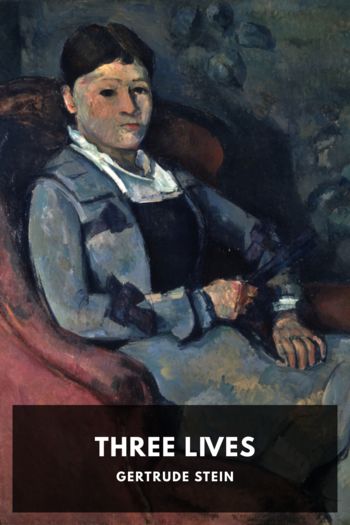Three Lives, Gertrude Stein [graded readers .txt] 📗

- Author: Gertrude Stein
Book online «Three Lives, Gertrude Stein [graded readers .txt] 📗». Author Gertrude Stein
By Gertrude Stein.
This ebook is the product of many hours of hard work by volunteers for Standard Ebooks, and builds on the hard work of other literature lovers made possible by the public domain.
This particular ebook is based on a transcription produced for Project Gutenberg and on digital scans available at the Internet Archive.
The writing and artwork within are believed to be in the U.S. public domain, and Standard Ebooks releases this ebook edition under the terms in the CC0 1.0 Universal Public Domain Dedication. For full license information, see the Uncopyright at the end of this ebook.
Standard Ebooks is a volunteer-driven project that produces ebook editions of public domain literature using modern typography, technology, and editorial standards, and distributes them free of cost. You can download this and other ebooks carefully produced for true book lovers at standardebooks.org.
Donc je suis malheureux et ce n’est ni ma faute ni celle de la vie.1
Jules Laforgue Three Lives Stories of the Good Anna, Melanctha and the Gentle Lena The Good Anna IThe tradesmen of Bridgepoint learned to dread the sound of “Miss Mathilda,” for with that name the good Anna always conquered.
The strictest of the one price stores found that they could give things for a little less, when the good Anna had fully said that “Miss Mathilda” could not pay so much and that she could buy it cheaper “by Lindheims.”
Lindheims was Anna’s favorite store, for there they had bargain days, when flour and sugar were sold for a quarter of a cent less for a pound, and there the heads of the departments were all her friends and always managed to give her the bargain prices, even on other days.
Anna led an arduous and troubled life.
Anna managed the whole little house for Miss Mathilda. It was a funny little house, one of a whole row of all the same kind that made a close pile like a row of dominoes that a child knocks over, for they were built along a street which at this point came down a steep hill. They were funny little houses, two stories high, with red brick fronts and long white steps.
This one little house was always very full with Miss Mathilda, an under servant, stray dogs and cats and Anna’s voice that scolded, managed, grumbled all day long.
“Sallie! can’t I leave you alone a minute but you must run to the door to see the butcher boy come down the street and there is Miss Mathilda calling for her shoes. Can I do everything while you go around always thinking about nothing at all? If I ain’t after you every minute you would be forgetting all, the time, and I take all this pains, and when you come to me you was as ragged as a buzzard and as dirty as a dog. Go and find Miss Mathilda her shoes where you put them this morning.”
“Peter!”—her voice rose higher—“Peter!”—Peter was the youngest and the favorite dog—“Peter, if you don’t leave Baby alone,”—Baby was an old, blind terrier that Anna had loved for many years—“Peter if you don’t leave Baby alone, I take a rawhide to you, you bad dog.”
The good Anna had high ideals for canine chastity and discipline. The three regular dogs, the three that always lived with Anna, Peter and old Baby, and the fluffy little Rags, who was always jumping up into the air just to show that he was happy, together with the transients, the many stray ones that Anna always kept until she found them homes, were all under strict orders never to be bad one with the other.
A sad disgrace did once happen in the family. A little transient terrier for whom Anna had found a home suddenly produced a crop of pups. The new owners were certain that this Foxy had known no dog since she was in their care. The good Anna held to it stoutly that her Peter and her Rags were guiltless, and she made her statement with so much heat that Foxy’s owners were at last convinced that these results were due to their neglect.
“You bad dog,” Anna said to Peter that night, “you bad dog.”
“Peter was the father of those pups,” the good Anna explained to Miss Mathilda, “and they look just like him too, and poor little Foxy, they were so big that she could hardly have them, but Miss Mathilda, I would never let those people know that Peter was so bad.”
Periods of evil thinking came very regularly to Peter and to Rags and to the visitors within their gates. At such times Anna would be very busy and scold hard, and then too she always took great care to seclude the bad dogs from each other whenever she had to leave the house. Sometimes just to see how good it was that she had made them, Anna would leave the room a little while and leave them all together, and then she would suddenly come back. Back would slink all the wicked-minded dogs at the sound of her hand upon the knob, and then they would sit desolate in their corners like a lot of disappointed children whose stolen sugar has been taken from them.
Innocent blind old Baby was the only one who preserved the dignity becoming in a dog.
You see that Anna led an arduous and troubled life.
The good Anna was a small, spare, german woman, at this time about forty years of age. Her face was worn, her cheeks were thin, her mouth





Comments (0)